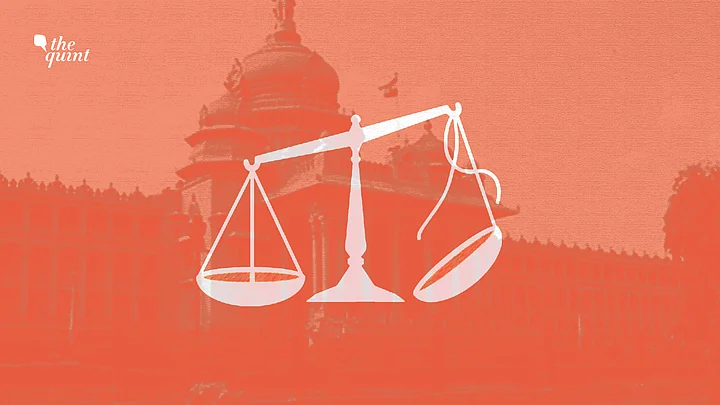Deciding on the fate of 15 rebel Karnataka MLAs, the Supreme Court on Wednesday took a decision that could potentially result in the fall of the Congress-JD(S) government in the state. There are two aspects to the court’s verdict:
- It has ruled that the 15 MLAs can’t be compelled to attend the House’s proceedings. This means that they will not be bound by the whip of their respective parties in the trust vote this week. If all 15 MLAs abstain, the strength of the House comes down to 209. BJP with 105 MLAs will be just above the half-way mark.
- It has refused the MLAs’ request that Karnataka Assembly Speaker KR Ramesh Kumar be instructed to decide on their resignations by 17 July. The court has ruled that the Speaker should be allowed to arrive at his decision at an appropriate time.
The court appears to be trying to arrive at a balance, not interfering with either the MLAs or the Speaker.
The result is that the Karnataka government’s fate will be decided by who is able to ‘manage’ the rebel MLAs better. If the MLAs stay away from the trust vote, as the BJP would hope for, the government would fall.
But if Congress and JD(S) manage to convince a few of them to return, the government might survive for now. In either case, the result will be decided not so much by procedure but by which party is able to ‘manage’ the numbers in its favour.
This goes against the spirit of the Anti-Defection Law – the aim of which was precisely to prevent the influence of money and muscle power.
In fact, the Supreme Court’s decision might end up diluting the Anti-Defection Law even further.
What Does the Anti-Defection Law Say?
The 52nd Amendment to the Tenth Schedule of the Indian Constitution – popularly known as the Anti-Defection Law – was passed in 1985 to deal with the increasing trend of lawmakers defecting from one party to the other.
According to the law, any member of Parliament or state legislature can be disqualified if he or she:
- Voluntarily gives up membership of his/her political party.
- Votes or abstains in the House, contrary to the whip of his/her party.
It also applies to Independent lawmakers or nominated members who join a party.
There are two other important clauses:
- The exception to this rule is if at least two thirds of the members of a particular party in the House decide to merge with another party. In such a scenario, both the members who have defected as well as those who haven’t will be protected from disqualification. Another exception is if the original party merges with another party.
- The decision to disqualify lies with the Speaker or Chairman of the House.
Recent Defections
- In Goa, 10 out of 15 Congress MLAs defected to the BJP. As this is exactly two-thirds, they were protected from being disqualified under the anti-defection law. Recently 12 out of 18 Congress MLAs in Telangana defected to the TRS under the same clause. Similarly four out of six Telugu Desam MPs in the Rajya Sabha moved to the BJP.
- However in the previous Telangana Assembly, 6 out of 21 Congress MLAs moved to the TRS, but the decision regarding their resignation remained pending with the Speaker.
- In Gujarat, Congress MLAs like Kunvarji Bavaliya and Jawahar Chavda resigned as MLAs and joined the BJP. Bavaliya contested the bypoll to his own vacated seat under a BJP ticket and won.
These cases indicate that two factors seem to be giving space for most of the defections:
- Discretion given to the Speaker: Few cases represent this better than the previous Telangana Assembly, in which the Congress MLAs defected to the TRS and continued to function without being disqualified as the Speaker kept his decision pending.
- In states with less number of MLAs, it is easier for the ruling party to secure the defection of two-thirds of the MLAs of another party. Goa is a good example where the number required was just 10.
Recommendations
There have been a few recommendations that aim to do away with the shortcomings of the Anti-Defection Law:
- The 1999 Law Commission suggested that mergers shouldn’t be exempt from disqualification.
- There have also been demands that the decision to disqualify should be taken by the Governor or President on the advice of the Election Commissioner, instead of the matter being left to the Speaker.
- The Constitution Review Commission of 2002 suggested that defectors should be barred from holding public office.
- An even more radical demand has been put forward by certain civil society groups that voters should be given the Right to Recall MPs and MLAs who have defected.
Why the SC Verdict Harms the Existing Law
The Anti-Defection Law has several shortcomings but the SC verdict on Wednesday dilutes the law even further. It has done that in two ways:
- By ruling that the rebel Karnataka MLAs cannot be forced to attend proceedings in the House, the court has rendered ineffective the Anti-Defection Law’s provision that members can be disqualified for not following their party’s whip.
- By not instructing the Speaker to decide on the MLAs resignations, it has provided space for further manipulation of defections. The manner in which the Speaker in the previous Telangana Assembly delayed acting on rebel Congress MLAs’ resignations could become a blueprint across the country.
Irrespective of what happens in the Karnataka Assembly, the battle against the politics of defections and horse-trading has become more difficult.
(At The Quint, we question everything. Play an active role in shaping our journalism by becoming a member today.)
